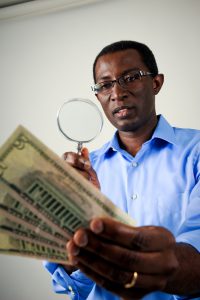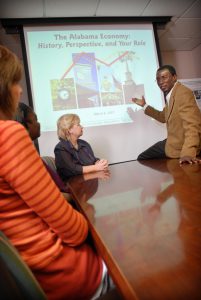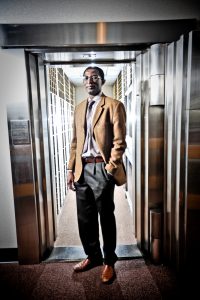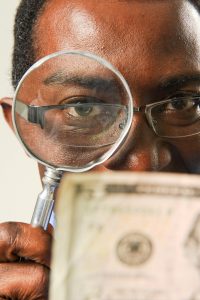By Bill Gerdes
Photos by Zachary Riggins

Around The University of Alabama’s Culverhouse College of Commerce and Business Administration, people often call Sam Addy the “Five-Dollar Man.”
Addy, a research economist who directs UA’s Center for Business and Economic Research, or CBER, hits up colleagues – and others, including off-campus and out-of-state people – for five dollars at every opportunity. He uses the money for charitable purposes. He even keeps a spreadsheet on his computer detailing who contributes.
Addy’s concern for those less fortunate is reflected in the way he views his professional responsibilities – responsibilities that have made him and CBER the go-to sources for economic information throughout the region, including the impact of the Gulf oil spill and the spate of tornadoes that ravaged the state last spring.
“We are here to serve,” Addy says, “and we contribute to the fulfillment of the research and service missions of the College and the University.”
Addy grew up in Ghana, Africa.
“I think I thought I would visit the U.S.,” Addy recalls of his childhood feelings. “But live here? I don’t know, because I started off in metallurgical engineering … and mining is a lucrative industry in Ghana … so I didn’t think I had an economic reason to leave Ghana. I actually came to the U.S. for graduate school. And then I realized, ‘wow, what a country.’ ”
ECONOMIC DEVELOPMENT = HIGHER QUALITY OF LIFE
Addy joined CBER in 1998 with an education grounded in engineering and mineral economics.
He says he was impressed when he visited the Center for the job interview.
“The Center was kind of laid back, but you could hear the hum of work going on, and I thought, ‘I would love to be here,’ ” he says.
As his position at CBER evolved, Addy says he became more interested in economic development. “That’s where I think my passion is. I don’t know if economic development captures it properly because of the definition some people have for that. By economic development I mean the quality of life goes up.”
Addy became associate director of CBER in 1999 and director in 2007, and he was named assistant dean for outreach last year.
“His expertise is recognized at the highest levels of state government,” says Dr. J. Michael Hardin, dean of the UA business school, “and he has become the state’s preeminent economist. He fully understands the ramifications of the nation’s volatile economy and the effects on Alabama.”

Last year alone, the center handled 631 requests for information and other assistance. The center has an active program of sponsored research focused mainly on the Alabama economy, including socioeconomic data collection and analysis, outreach activities that support the state, including work by the Alabama State Data Center, and it provides research support for the business school faculty and its international and college-outreach programs.
The Center itself has a staff of 13, including nine analysts and four support personnel. Addy notes that in a partnership between the business school and the UA College of Arts and Sciences, the Capstone Poll, which employs another 22 people, is a part of CBER.
‘A VALUABLE PARTNER’
CBER clientele include federal, state and local governmental agencies, companies, educational institutions, financial institutions, individuals, the media and other organizations.
In the year ending April 30, five of its research projects were funded for more than $1.5 million. Proposals came from such organizations as the Alabama Department of Industrial Relations, BBVA Compass, the Coalition for Regional Transportation, the U.S. Department of Labor, the U.S. Small Business Administration, and the Economic Development Partnership of Alabama.
“Sam Addy has been a valuable partner for Alabama’s economic development community,” says Bill Taylor, president of the Economic Development Partnership of Alabama. “We find in Sam an academic who has an ability to be pragmatic when it comes to economic development.”

“The importance of a credible, independent research organization, such as CBER, to Alabama’s economic development efforts cannot be overstated,” says Taylor. “We have used their services extensively through the years—to recruit companies to locate within the state; to study the economic impact of companies or industries already operating in the state; and for more customized needs. Recently, the work that Sam has done on the economic impact of the 2010 gulf oil spill and the 2011 tornadoes on Alabama has been especially valuable as we look for strategies to address the needs and opportunities created by these disasters.”
“Everything is important,” Addy says. “We sometimes touch on things that are not politically popular, but, from our perspective, you don’t have to be popular. Our commitment is to economic development of the state so whatever would advance that, we analyze it and provide the research.”
The Alabama State Data Center, which CBER houses, is the state’s lead agency for the U.S. Bureau of the Census. It produces population projections for the state and its counties.
DON’T JUST REBUILD, BUT REINVENT
CBER collects, maintains, analyzes and releases business and economic data from a wide array of federal and state sources, making the Center an information conduit to government agencies and business reporters nationally.
“We do have a vast amount of data,” Addy said. “I will be frank; I am still learning how much data we have.”
The Center has presented an annual Economic Outlook Conference each January for the past 23 years, the most recent of which was supported by grants from the Alabama Department of Economic and Community Affairs, Alabama Power Co., Alabama SBDC Network, BBVA Compass, BlueCross BlueShield of Alabama, Boeing Co., Hyundai Motor Manufacturing of Alabama, Mercedes-Benz U.S. International, Sterne Agee and Vulcan Materials.
“We have to find the resources to make sure that we are addressing areas that advance economic development,” Addy says. “For example, in the case of the recent tornado economic impact report, for us the most important point … is not to rebuild but to reinvent and reinvest.”

Addy is not shy about mounting a soapbox to share his opinions on various needs and using his research to back up those opinions.
“If you don’t like that soapbox where I say that ‘we want your life to be better,’ then hey, you have the right to it, but that’s what we are concerned about, we want your life to be better in the future.”
“Sam Addy is certainly a valuable resource for this state,” says Tom Surtees, Alabama’s director of industrial development. “He understands our economy and our people. He can take complicated data and express it so that those of us who are not economists can understand the results. An economist with a personality, Sam can present you with good news or bad, and you still enjoy listening to him.”
“I love my job,” Addy says. “I see the way we help people make better decisions and, along with that, the changing of perspectives that people have about approaching issues. It becomes very clear how this University contributes to that, and we only have a small slice of this contribution.”
Addy’s vision for Alabama is for “a state with people who think, where we love each other, because we need each other to advance and, because we think, we will act appropriately and not fail to monitor the results of our actions, because we need to act consistently. And, that goes for the nation as well.”
“Dr. Hardin taught me a good lesson: you have to work yourself up and out of a job if you want to have a better life. You can’t think of yourself as staying in one place, you have to pass on your knowledge, and let others grow.”
